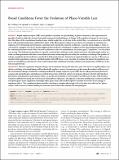| dc.contributor.author | Palmer, Mark A. | |
| dc.contributor.author | Lipsitch, Marc | |
| dc.contributor.author | Moxon, E. R. | |
| dc.contributor.author | Bayliss, C. D. | |
| dc.date.accessioned | 2016-02-09T21:41:30Z | |
| dc.date.issued | 2013 | |
| dc.identifier | Quick submit: 2015-12-30T17:14:12-05:00 | |
| dc.identifier.citation | Palmer, M. E., M. Lipsitch, E. R. Moxon, and C. D. Bayliss. 2013. “Broad Conditions Favor the Evolution of Phase-Variable Loci.” mBio 4 (1) (January 8): e00430–12–e00430–12. doi:10.1128/mbio.00430-12. | en_US |
| dc.identifier.issn | 2150-7511 | en_US |
| dc.identifier.uri | http://nrs.harvard.edu/urn-3:HUL.InstRepos:25143685 | |
| dc.description.abstract | Simple sequence repeat (SSR) tracts produce stochastic on-off switching, or phase variation, in the expression of a panoply of surface molecules in many bacterial commensals and pathogens. A change to the number of repeats in a tract may alter the phase of the translational reading frame, which toggles the on-off state of the switch. Here, we construct an in silico SSR locus with mutational dynamics calibrated to those of the Haemophilus influenzae mod locus. We simulate its evolution in a regimen of two alternating environments, simultaneously varying the selection coefficient, s, and the epoch length, T. Some recent work in a simpler (two-locus) model suggested that stochastic switching in a regimen of two alternating environments may be evolutionarily favored only if the selection coefficients in the two environments are nearly equal ("symmetric") or selection is very strong. This finding was puzzling, as it greatly restricted the conditions under which stochastic switching might evolve. Instead, we find agreement with other recent theoretical work, observing selective utility for stochastic switching if the product sT is large enough for the favored state to nearly fix in both environments. Symmetry is required neither in s nor in sT. Because we simulate finite populations and use a detailed model of the SSR locus, we are also able to examine the impact of population size and of several SSR locus parameters. Our results indicate that conditions favoring evolution and maintenance of SSR loci in bacteria are quite broad.
IMPORTANCE:
Bacteria experience frequent changes of environment during the infection cycle. One means to rapidly adapt is stochastic switching: a bacterial lineage will stochastically produce a variety of genotypes, so that some descendants will survive if the environment changes. Stochastic switching mediated by simple sequence repeat (SSR) loci is widespread among bacterial commensals and pathogens and influences critical interactions with host surfaces or immune effectors, thereby affecting host persistence, transmission, and virulence. Here, we use the most detailed in silico model of an SSR locus to date, with its phase variation calibrated to match the mod locus of Haemophilus influenzae. The type III restriction-modification system encoded by mod participates in the regulation of multiple other genes; thus, SSR-mediated phase variation of mod has far-reaching cis-regulatory effects. This coupling of phase-variable switching to complex phenotypic effects has been described as the "phasevarion" and is central to understanding the infection cycle of bacterial commensals and pathogens. | en_US |
| dc.language.iso | en_US | en_US |
| dc.publisher | American Society for Microbiology | en_US |
| dc.relation.isversionof | doi:10.1128/mBio.00430-12 | en_US |
| dash.license | LAA | |
| dc.title | Broad Conditions Favor the Evolution of Phase-Variable Loci | en_US |
| dc.type | Journal Article | en_US |
| dc.date.updated | 2015-12-30T22:14:13Z | |
| dc.description.version | Version of Record | en_US |
| dc.rights.holder | Marc Lipsitch | |
| dc.relation.journal | mBio | en_US |
| dash.depositing.author | Lipsitch, Marc | |
| dc.date.available | 2016-02-09T21:41:30Z | |
| dc.identifier.doi | 10.1128/mBio.00430-12 | * |
| dash.contributor.affiliated | Palmer, Mark | |
| dash.contributor.affiliated | Lipsitch, Marc | |


